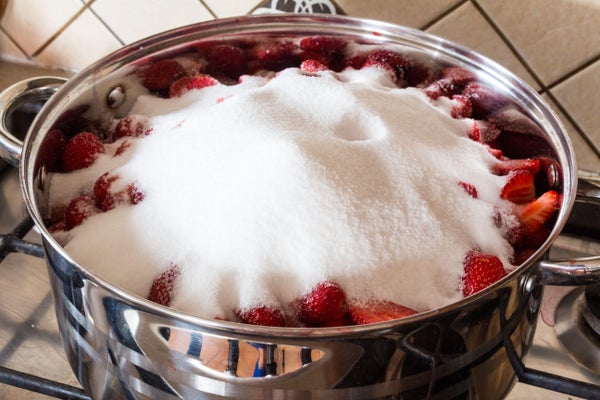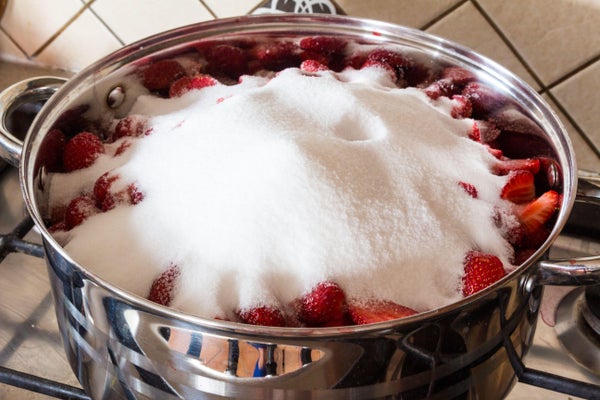August 22, 2024
4 min read
Artificial Sweetener Erythritol Linked to Blood Clots, Study Warns
A new study suggests a commonly used sugar substitute could increase the risk of blood clots, raising concerns for heart complications

Erythritol, a common sugar substitute, in homemade strawberry jam.
Sugar-free food and drinks may not be a healthier choice after all. Used since the 1990s in everyday products from gum and candy to cookies and diet sodas, the artificial sweetener erythritol has 70 percent of the sweetness of sugar but far fewer calories. It is also commonly blended with stevia-based sweeteners to increase their volume and sweetness and give them a sugarlike texture. The Food and Drug Administration lists erythritol as safe—but in the past couple of years, experts have suggested that it may adversely affect cardiovascular health. And a study published this month in Arteriosclerosis, Thrombosis, and Vascular Biology has found that erythritol may be linked to an increased risk of thrombosis, the formation of vessel-blocking blood clots.
In the new study, all participants who drank a beverage containing erythritol were found to have major changes to their platelets—tiny cell fragments that flow in our blood and build up around a wound to stem bleeding. The changes included an increased tendency for platelets to clump together, says study co-author Stanley Hazen, a physician and researcher of cardiovascular medicine at Cleveland Clinic. Erythritol, he says, “increased the susceptibility of a person or their platelets for clotting and aligned with all the prior data that had been collected.”
Erythritol is chemically described as a “sugar alcohol.” Small amounts of it occur naturallyin certain fruits and vegetables and in fermented foods, including cheese and wine. The compound is even naturally produced in some cells of the human body. But emerging evidence indicates that consuming erythritol as a sugar substitute may pose health risks. The new study builds on research by Hazen and the Cleveland Clinic team in 2023 in which blood plasma samples from more than 4,000 participants suggested a link between high erythritol levels and an increased rate of heart attacks and strokes. “This is an unrecognized concern,” Hazen says. “With every cohort we look at, higher levels of erythritol are tracking with higher future risk of [cardiovascular] events.”
On supporting science journalism
If you’re enjoying this article, consider supporting our award-winning journalism by subscribing. By purchasing a subscription you are helping to ensure the future of impactful stories about the discoveries and ideas shaping our world today.
The new study looked more closely at erythritol’s effects in a smaller group of 20 healthy people. Researchers first looked at each participant’s blood plasma to establish baseline platelet clumping activity. One group of 10 people then drank 30 grams of erythritol (the mean amount that an individual in the U.S. consumes per day, according to the FDA), and the other participants took 30 grams of glucose (ordinary sugar). After 30 minutes, their plasma was once again examined to determine clumping activity. Those who had consumed erythritol had a more than 1,000-fold increase of the compound in their blood—and a significant jump in platelet clotting activity. No such changes were observed in participants who had ingested glucose.
“The current data that we have is arguing that having the glucose-sweetened beverage in moderation is actually a safer choice than the erythritol-sweetened drink,” Hazen says.
Inadvertent clotting can lead to huge problems in a blood vessel and potentially cause strokes, pulmonary embolisms, heart attacks and other complications. The study team is still yet to identify an underlying mechanism by which erythritol seems to boost clotting; Hazen thinks it may have something to do with “receptors on the surface of a platelet that is interacting with the erythritol.” Such an interaction might alter the way platelets process signals about when to clump.
Although the recent findings raise concerns about erythritol, other experts in the field think more research is needed before considering the sweetener “unsafe.”
“This study did not look at long-term exposure [to] dietary erythritol,” says Duane Mellor, a registered dietician in the U.K. “It looked at the metabolic effects of a high dose in a drink and then plasma levels” only minutes after consumption. Mellor thinks it would be rash to directly link immediate heightened erythritol levels with long-term cardiovascular disease risks. “There is a large extrapolation or jump from one to another,” he says. Mellor adds that “diet is not the only source of erythritol” and that the new study didn’t take into account the erythritol produced by the body’s normal metabolic processes.
The recent study also had a relatively small sample base; larger-scale human trials are needed to confirm the findings. Alice Lichtenstein, senior scientist and leader of the Cardiovascular Nutrition Team at the Jean Mayer USDA Human Nutrition Research Center on Aging at Tufts University, hopes for broader, more comprehensive research on multiple sweeteners to “systematically compare different nonnutritive [or artificial] sweeteners relative to each other and to sugar.” Much of researchers’ current knowledge, she says, is “based on different pieces of the puzzle joined together.” She explains that various studies on sweeteners have used differing methods of analysis or have only considered a patchwork of effects. For example, one sweetener might be looked at for heart attack risk, whereas another might only be tested for effects on blood sugar levels. “Many times, the studies are not directly comparable,” she notes.
Hazen agrees that more research is needed on both the health effects of dietary erythritol and on potentially safer alternatives. Overall, previous studies on sweeteners’ benefits for losing weight and managing diabetes have had mixed results, he says. “Even [the World Health Organization is] recommending avoiding artificial sweeteners as there is not enough evidence enough to support their benefit,” Hazen says. Until there are more data, he remains cautious about erythritol. “As a physician who takes care of diabetic patients and patients at risk of thrombotic events, I used to recommend artificial sweeteners,” he says. “Now I tell them, ‘Stay away from the artificial stuff until we know more.’”

